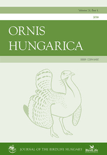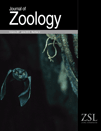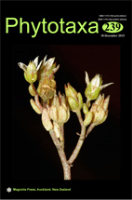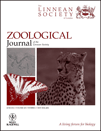
RUSSIAN JOURNAL OF NEMATOLOGY
metrics 2024
Diving Deep into Nematode Ecology and Evolution
Introduction
RUSSIAN JOURNAL OF NEMATOLOGY, published by the Russian Academy of Sciences, Institute of Parasitology, serves as an essential platform for disseminating comprehensive research on nematodes and their ecological significance. With a strong foundation since its inception in 1996, this journal addresses critical areas within the fields of Animal Science and Zoology, as well as Ecology, Evolution, Behavior, and Systematics, currently positioned in the Q3 category for both domains. In 2023, the journal ranks #216 out of 490 in Animal Science and Zoology, and #387 out of 721 in Ecology, reflecting its growing impact within the scientific community. Though it is not an open-access journal, RUSSIAN JOURNAL OF NEMATOLOGY remains a pivotal resource for researchers, professionals, and students seeking to advance their understanding of nematological science, particularly in the context of ecological interactions and parasitic relationships. Each issue synthesizes innovative research findings that contribute to the broader discourse on biodiversity and ecosystem health.
Metrics 2024
 0.28
0.28 0.90
0.90 0.90
0.90 25
25Metrics History
Rank 2024
Scopus
IF (Web Of Science)
JCI (Web Of Science)
Quartile History
Similar Journals

NEMATROPICA
Fostering Knowledge in Nematode ManagementNEMATROPICA is a distinguished academic journal dedicated to advancing the field of nematology and its relevance to agronomy and crop science. Published by the Organization of Tropical American Nematologists, this journal serves as a crucial platform for researchers, professionals, and students to disseminate original research and reviews focused on the biology, ecology, and management of nematodes within agricultural systems. With an evolving history since its inception in 1988, NEMATROPICA has consolidated its reputation, currently holding a Q3 classification in Agronomy and Crop Science for 2023, indicating its respected standing within the field. Although the journal is not open access, its valuable contributions underscore the importance of nematodes in ecological interactions and pest management strategies, making it essential reading for those committed to enhancing agricultural productivity and sustainability. The journal's contact address is Auburn University, Department of Plant Pathology, Auburn, AL 36849, United States.

BOTANICAL REVIEW
Illuminating the complexities of botanical research.BOTANICAL REVIEW is a highly esteemed journal published by SPRINGER, renowned for its commitment to advancing the fields of Ecology, Evolution, Behavior and Systematics and Plant Science. Established in 1935, this journal has become a cornerstone for researchers and professionals, reflecting over eight decades of rigorous scholarship. With an impressive impact factor and ranking within the top quartile for both its fields—Q1 in Ecology, Evolution, Behavior and Systematics and Plant Science—BOTANICAL REVIEW remains a key platform for disseminating critical findings and fostering scientific dialogue. Although it is not an open-access journal, its accessibility through institutional subscriptions enhances its reach among the academic community. The journal not only emphasizes the ecological aspects of plant life but also integrates evolutionary context to inform current practices and theories in botany. With a dedication to exploring the complex interactions within botanical sciences, BOTANICAL REVIEW continues to shape the future of plant research.

JOURNAL OF NEMATOLOGY
Pioneering Research for Sustainable Crop SolutionsJOURNAL OF NEMATOLOGY, published by the SOC NEMATOLOGISTS, serves as a crucial platform for cutting-edge research in the fields of nematology, agronomy, and crop science. With an ISSN of 0022-300X and an E-ISSN of 2640-396X, this esteemed journal has been an open-access resource since 2016, enabling a wider audience to engage with its findings. The journal is recognized for its high-quality publications, currently holding a Q2 ranking in Agronomy and Crop Science as per the 2023 category quartiles. With a Scopus rank of #171 out of 406 in Agricultural and Biological Sciences, it occupies a vital position in disseminating knowledge crucial for advancing research and practices related to nematodes and their impact on crop productivity. The JOURNAL OF NEMATOLOGY aims to foster collaboration among researchers, professionals, and students, ultimately contributing to the sustainability and productivity of agricultural systems.

ORNIS HUNGARICA
Championing high-quality research in animal sciences.ORNIS HUNGARICA, an esteemed journal in the fields of Animal Science and Zoology as well as Ecology, Evolution, Behavior and Systematics, is published by Walter de Gruyter GmbH, a leading scientific publisher renowned for its commitment to disseminating high-quality research. Operating under an Open Access model since 2012, this journal provides invaluable access to scholarly articles, fostering collaboration and knowledge sharing among researchers and professionals. With its ISSN 1215-1610 and E-ISSN 2061-9588, ORNIS HUNGARICA has become a noteworthy platform for innovative studies and findings from Hungary and beyond, contributing significantly to the discourse in its field. As indicated by its Q3 ranking in Animal Science and Zoology and Q4 ranking in Ecology, the journal is recognized for its diverse research contributions, although it aims to expand its reach and relevance in future editions. Researchers and students alike will find in ORNIS HUNGARICA a dedicated resource for advancing knowledge and furthering the understanding of avian biology and ecology.

Neotropical Biodiversity
Empowering scientists to understand and preserve Neotropical life.Neotropical Biodiversity is a prominent journal dedicated to advancing our understanding of biodiversity and ecological dynamics within the Neotropical region. Published by TAYLOR & FRANCIS LTD in the United Kingdom, this Open Access journal has been providing unrestricted access to research findings since 2015, fostering collaboration and knowledge sharing among the global scientific community. With an emphasis on innovative research in Ecology, Ecology, Evolution, Behavior and Systematics, and Global and Planetary Change, it has earned a reputation for excellence, currently holding a Q3 category in its field. As of 2023, the journal ranks in the 37th percentile for Environmental Science (Ecology) and in the 36th percentile for Agricultural and Biological Sciences (Ecology, Evolution, Behavior and Systematics), making it a valuable resource for researchers, professionals, and students interested in understanding and preserving biodiversity in one of the world's most diverse ecosystems. We invite you to explore the cutting-edge research published in Neotropical Biodiversity and contribute to the ongoing dialogue for environmental sustainability and ecological resilience.

JOURNAL OF ZOOLOGY
Bridging foundational research with innovative zoological studies.JOURNAL OF ZOOLOGY, published by Wiley, stands as a premier scholarly journal in the fields of Animal Science and Zoology, renowned for its outstanding contributions to the knowledge of animal biology and ecology. With an impressive impact factor and a strong ranking in the Q1 category for Animal Science and Zoology, as well as Q2 for Ecology, Evolution, Behavior, and Systematics, the journal rigorously engages with both foundational research and groundbreaking discoveries since its inception in 1830. Located in Hoboken, New Jersey, this journal is dedicated to fostering the academic community's understanding of zoological sciences, providing access to important research that shapes wildlife conservation efforts and ecological studies. Although the journal does not currently offer open access options, it continues to attract significant attention, as evidenced by its strong Scopus rankings in related categories. Researchers, professionals, and students will find invaluable resources in the JOURNAL OF ZOOLOGY to advance their understanding of animal life and the ecological challenges it faces today.

RUSSIAN JOURNAL OF HERPETOLOGY
Championing High-Quality Research in HerpetologyRUSSIAN JOURNAL OF HERPETOLOGY is a prominent scholarly publication dedicated to the field of herpetology, focusing on the study of reptiles and amphibians. Published by FOLIUM PUBL CO in the Russian Federation, this journal aims to foster the exchange of knowledge and research in animal science, ecology, evolution, and behavior. With its ISSN 1026-2296 and a significant commitment to high-quality academic discourse, the journal maintains a respectable standing within the Q3 quartile in both Animal Science and Zoology, as well as in Ecology, Evolution, Behavior, and Systematics. This attributes to its Scopus rank among leading journals in related fields, enhancing its visibility and influence. Spanning from 2014 through 2024, it publishes rigorous research that explores the diversity, biology, and conservation of herpetofauna, making it a vital resource for researchers, professionals, and students alike who are invested in the ecological and evolutionary dynamics of these species.

Phytotaxa
Unveiling the Secrets of Plant SystematicsPhytotaxa, published by MAGNOLIA PRESS, is an esteemed journal in the fields of Plant Science and Ecology, Evolution, Behavior and Systematics. Established to cater to the growing need for high-quality research dissemination in botany, this journal presents the latest findings in plant taxonomy, systematics, and biodiversity. With its H-Index reflecting significant academic influence, and recognized as Q2 in Plant Science and Q3 in Ecology by Scopus, it stands as a reputable source for scholars and practitioners alike. The journal operates without open access restrictions, allowing for a wider reach to its audience. Positioned in New Zealand, Phytotaxa has been pivotal since its inception, contributing to the global understanding of plant diversity and ecology from 2010 to 2024. Its rigorous peer-review process ensures the high quality of published articles, making it an essential resource for researchers, professionals, and students dedicated to advancing the field of botany.

ZOOLOGICAL JOURNAL OF THE LINNEAN SOCIETY
Unraveling the complexities of animal behavior and systems.Zoological Journal of the Linnean Society, published by Oxford University Press, stands as a prestigious vessel for scholarly discourse in the fields of Animal Science and Ecology. With an ISSN of 0024-4082 and E-ISSN 1096-3642, this journal has an illustrious history dating back to its inception in 1866, and has consistently contributed groundbreaking research that shapes our understanding of zoology and evolutionary biology. Operating out of the United Kingdom, the journal boasts an impressive Q1 ranking in both Animal Science and Zoology and Ecology, Evolution, Behavior and Systematics, positioning it among the top tier of its category. With a significant presence in the academic landscape, the journal ranks 24th among 490 in Animal Science and 97th among 721 in Ecology, reflecting its impact and relevance in the field. Although it is not an open access journal, the wealth of knowledge it offers is invaluable for researchers, professionals, and students alike, aiding in the advancement of zoological sciences.

NEMATOLOGY
Elevating the Discourse on Nematodes and Their RolesNematology is a prominent journal published by BRILL, focusing exclusively on the multifaceted realm of nematodes and their ecological, agricultural, and biological implications. With an ISSN of 1388-5545, this esteemed journal serves as a vital platform for researchers, professionals, and students dedicated to advancing knowledge in Agronomy and Crop Science and Ecology, Evolution, Behavior, and Systematics. Established in 1999 and continuing its mission until 2024, Nematology holds a Q2 ranking in Agronomy and Crop Science and a Q3 ranking in Ecology as of 2023, indicating its significant impact within these fields. Published in the Netherlands, this journal is accessible through various options, providing vital insights into nematological research and its applications. Researchers from around the globe are encouraged to explore, submit manuscripts, and contribute to the evolving discourse within this specialized yet pivotal area of study.